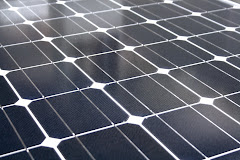 Would you install a solar energy system or a windmill if the power company would pay you for the electricity? That's the idea behind a bill being debated in Augusta, Georgia.
Would you install a solar energy system or a windmill if the power company would pay you for the electricity? That's the idea behind a bill being debated in Augusta, Georgia.The plan is called a "feed-in tariff," and supporters say it would dramatically increase demand for renewable energy systems in the state. The plan would require utilities to buy electricity generated by homeowners or small businesses, and pay them a premium price, far more than the cost of electricity from big power plants. The cost would be passed on to consumers, but supporters of the bill think Maine people would be willing to pay the extra cost.
Peter Drum from Midcoast Green Collaborative said, "I think they will when they realize what it means for Maine. For one there's huge job growth potential. Right now we're in a terrible economic strait. Germany has created over 300,000 jobs because of their feed-in tariff, and we think there will be similar rates of job growth in Maine. A conservative estimate we have is 3,000 jobs."
But not everyone thinks the "feed-in" tariff is a good idea. Central Maine Power Company says there are major problems with the plan. A lobbyist for the company testified to the legislature's utilities committee that Maine tried something similar, back in the 1980s when electric companies were told to sign long-term contracts with large private power plants called non-utility generators. The plan backfired and cost billions of dollars.
The sponsor of the bill, Representative Herb Adams of Portland, says the tariff plan is much different because it involves homeowners and small businesses and not big power plants.







No comments:
Post a Comment